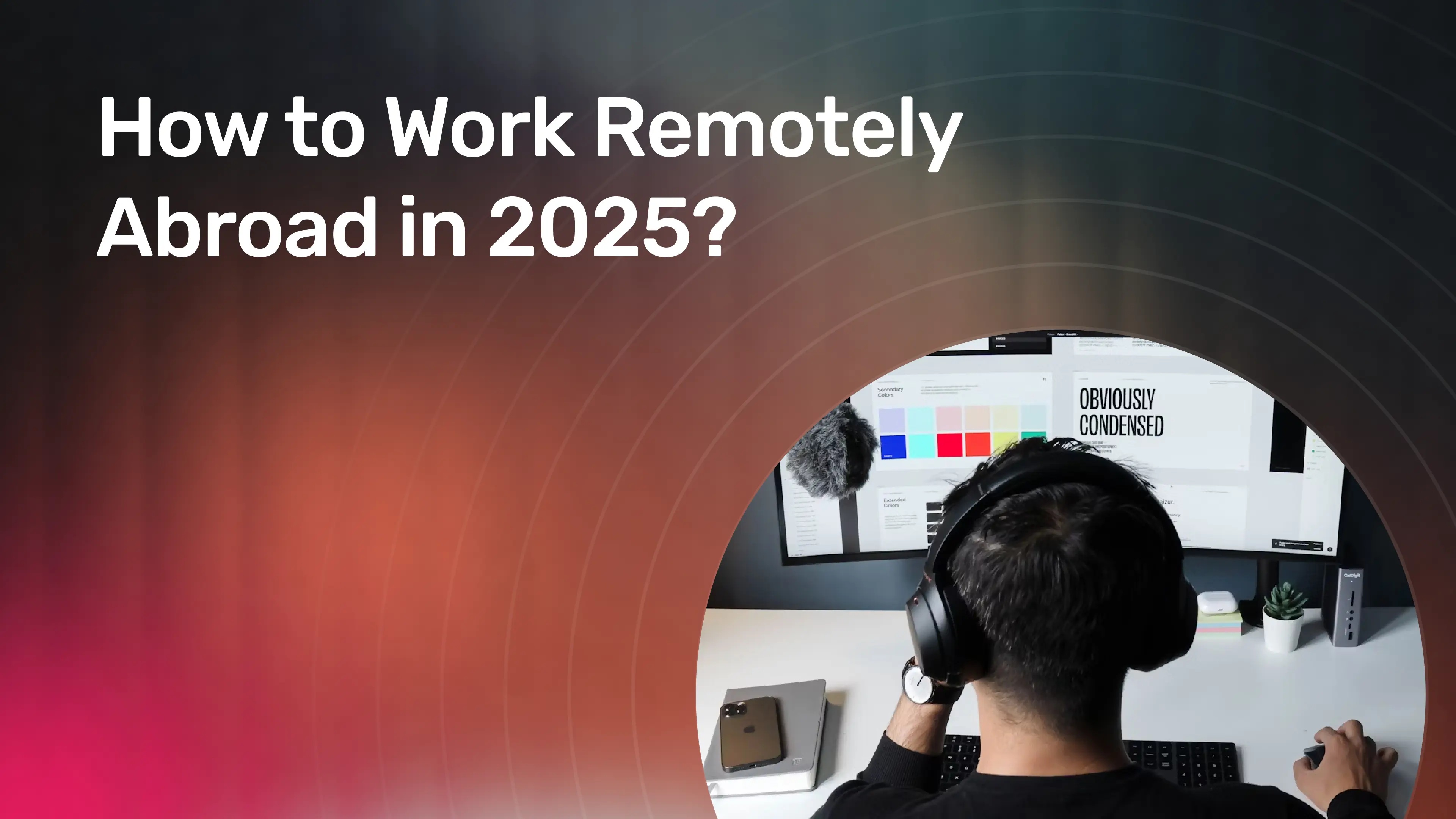How to Work Remotely Abroad in 2025? [A Complete Guide]
The dream of working from the pristine beaches in Bali or magnificent vistas in Barcelona has become a reality for many professionals. With a laptop and a stable internet connection, the world is your oyster. However, working remotely abroad also presents a set of challenges regarding taxes, visas, and time-zone differences.
We’ve created the ultimate guide to working remotely abroad, covering the reasons why you should embark on this adventure, any challenges you might face and how to overcome them. Plus, you’ll get answers to your burning questions about remote work.

Why should you work remotely from abroad?
Working remotely from abroad comes with many benefits which can enrich your professional and personal life. Let’s dive into some of the key benefits.
Experience new culture
Globetrotting enables you to get immersed in new cultures, languages, and ways of working. It creates a feeling of appreciation for different traditions and broadens your worldview. Not to mention that it infuses a new creative wave into your work and inspires you to think outside of the box like never before.
Learn a new language
Although apps and courses are helpful, nothing beats daily immersion in a new culture. You'll pick up the language naturally as you chat with neighbours, order coffee, or shop at local markets. And a new language added to your CV would look perfect, right? Whether you're learning Spanish in Barcelona or Italian in Rome, combining remote work with language learning lets you develop new skills while earning an income.
Save money
Living abroad can also help you reduce your living expenses if you opt to work from a low-cost country. It’s one of the reasons why locations like Bali, Portugal, and Mexico have become popular destinations among digital nomads and remote workers. The money that you save on food, transportation, and rent can be used to fund your future travel plans.
Advance your career
If you're aiming for a promotion or planning to switch careers, remote work experience can help set you apart in today's global job market. Besides the creativity boost, you’ll develop valuable skills like cross-cultural communication, adaptability, and independent problem-solving. Many employers place a lot of value on such skills.
Check out the 8 remote work skills to be successful at a remote job

How to legally work remotely from abroad?
Preparing for your remote work adventure also means taking into account the legal landscape of the country. This section will inform you about staying on the right side of the law when working remotely abroad.
Secure the right visa
First thing first, research the visa requirements for your chosen destination. Some countries offer a digital nomad visa, which enables you to work remotely without applying for a residency. The stay period with a digital nomad visa spans from 6 months to a year. On the other hand, some countries allow digital nomads to work on a tourist visa. With many different types of visas, it’s crucial to understand each visa's purpose and conditions.
Get the right classification
Understanding your work status is essential when working remotely from abroad. You'll typically fall into one of 2 categories: an employee of a local company or an independent contractor. When you're a full-time employee, your company might limit remote work to your home country. Contractors generally have more freedom to work from anywhere. Understanding whether you're an employee or contractor helps avoid misclassification and any penalties.
Know your tax obligations
Working remotely from abroad can complicate your tax situation. You might need to pay taxes in both your home country and where you're living, though tax treaties between countries can help prevent double taxation. The length of your stay matters, too - staying in a country for more than 183 days usually makes you a tax resident there. Keep detailed records and consider working with tax experts who understand international tax laws.
Learn more about legal issues in remote work
Get international health insurance
Your regular health insurance might not cover you while working abroad, and local healthcare systems aren't always accessible to foreign remote workers. International health insurance fills this gap by providing coverage no matter where you work. Look for a plan that includes both routine care and emergency services, and check if it covers remote workers and digital nomads specifically.

5 Tips for working remotely from abroad
If you want to get the most out of the remote work arrangement abroad, make sure to check out the tips we’ve outlined in the section below.
1. Create a productive workspace
Working from home can come with distractions, and that’s not an exception when working abroad. That’s why it’s important to choose a dedicated area with good lighting and minimal distractions, ideally separate from where you sleep or relax. This can be a productive home office, a rented spot at a local co-working space or a relaxing café.
You might be interested in the top strategies for increasing workplace productivity
2. Practice async communication
Working across time zones requires mastering asynchronous communication. Instead of expecting immediate responses, structure your messages to be clear and self-contained. Include necessary context, clear action items, and realistic deadlines while keeping in mind the time differences. This respects everyone’s time and ensures a smooth workflow.
3. Prioritise a healthy work-life balance
Finding equilibrium requires intentional effort – you need to create clear start and end times for your workday, set aside dedicated time for experiencing your new environment and learn to say no to work requests that fall outside your established boundaries. The key is remembering that you moved abroad not just to work remotely but to embrace a new way of living.
4. Meet like-minded people
Building a social network is one of the best ways to combat loneliness and isolation when working from a new location. Join digital nomad communities and coworking spaces where you can connect with other remote professionals who understand your lifestyle. Attending local meetups and events in your industry can expand both your professional and social circles.
5. Stay connected and secure
Maintaining reliable and secure connectivity is essential for remote work success abroad. Set up a backup internet solution, such as a mobile hotspot or a portable WiFi device, to ensure you're never offline during crucial meetings. Invest in a trusted VPN service to protect your data and access region-restricted work tools.

Challenges when working remotely from abroad
Working remotely from new countries opens up new opportunities, but you might also experience certain challenges along the way. Here are some challenges that you should prepare for when working remotely abroad.
Time zone differences
When your afternoon is your colleague's early morning, coordinating meetings becomes a delicate balancing act. You might find yourself working split shifts – catching team meetings late at night or early in the morning, then completing focused work during your local daylight hours. This schedule juggling can blur the lines between work and personal time, potentially leading to burnout if not managed carefully.
Loneliness
Working remotely from abroad can bring unexpected waves of isolation, even in the most vibrant locations. Without the daily social interactions of a traditional office, you might miss casual conversations with colleagues or simply have someone nearby to bounce ideas off. This makes it crucial to maintain contact with loved ones back home and build new connections.
Work-life balance
Without the physical separation of leaving an office, you might find yourself constantly checking emails during what should be your exploration time or working late to accommodate your home office's schedule. The excitement of being in a new country can also pull you in the opposite direction, tempting you to shortchange work commitments for local experiences.
Cultural adjustments
Cultural shock is quite common when working from another country. For instance, many US workers might be shocked that European restaurants close around siesta time or dinner starts later. Adjusting to these differences might take some time, but having an open mind can help you get accustomed faster.

Most common questions about working remotely from abroad
Let’s answer some questions that might be troubling you about working remotely from abroad.
Can you work remotely from another country?
Absolutely! However, before booking that ticket to your dream destination, it’s important to check your employer's policies regarding working remotely abroad, the visa situation, and tax obligations. In that way, you’ll ensure full legal compliance and a stress-free experience.
Do you have to pay taxes if you work remotely from another country?
Whether you have to pay taxes while working remotely from another country depends on local tax laws, your stay duration, and your home country’s rules. Many countries tax foreigners after 183 days, while some offer digital nomad visas with tax exemptions. Your income source also matters — some nations tax foreign income, others don’t.
To avoid issues, take a look at local regulations or consult a tax expert before relocating.
What countries can I work remotely from?
You can work remotely from many countries, but visa policies, tax rules, and infrastructure vary. Several countries offer digital nomad visas, including Portugal, Spain, Italy, Costa Rica, Mexico, Brazil, and the Bahamas. Some countries allow remote work on a tourist visa.
So, it’s important to check visa requirements on the official government or immigration websites of the country you’re interested in.
How can you find remote-friendly employers?
Start your remote job search on platforms like LinkedIn, Indeed, We Work Remotely, Remote.co, and FlexJobs. Attending events and networking in online communities on Reddit and Quora can also help your search efforts.
Work from anywhere with Native Mobility
Looking at the visa requirements and tax obligations might completely detract you from working remotely abroad. Luckily, with the help of Native Mobility, you can work outside of your home country and still ensure full alignment with international labour laws. We offer visa and work permit assistance for a smooth relocation process that isn’t hampered by the endless paperwork.
Just choose the destination, and we’ll work from the background — performing eligibility checks, gathering the necessary documentation, and ensuring compliance with regulatory frameworks. Learn more about our services by scheduling a demo call.
Bottom line
Working remotely from another location allows you to take your career on the road. And the journey starts with securing a proper visa, understanding your tax obligations, or building a solid routine. Although there are challenges, such as time zone differences and staying connected, the rewards far outweigh the hurdles.
Plus, with Native Teams by your side, all the paperwork and legal compliance get out of the picture, allowing you to focus solely on your work and exploring.
